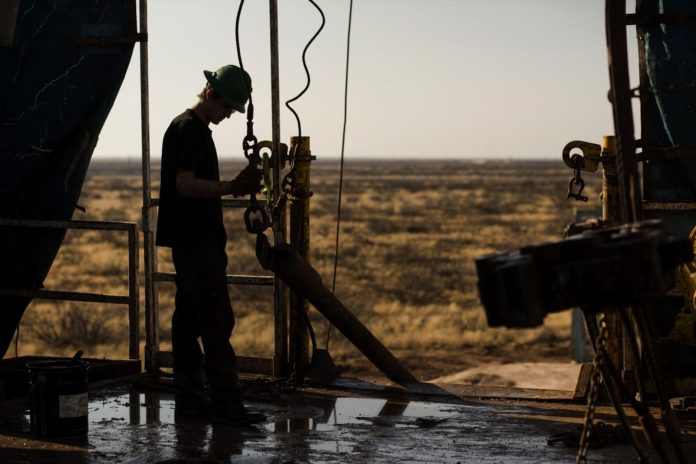The world’s two largest providers of oilfield drilling and fracking services have now declared that the worst may be over in the two-year-old oil market crash.
Schlumberger said Thursday that the oil industry appears to have reached the bottom of the cycle, echoing smaller rival Halliburton Co., which on Wednesday said the North American market reached its lowest point in the second quarter and is poised for modest growth the rest of this year.
“They’re the two dominant players in the market, both of whom just called the bottom,” James West, an analyst at Evercore-ISI in New York, said Thursday in an interview. “It’s a positive. Calling the bottom in the market sends the right signal and Schlumberger has a ton of credibility.”
As the downturn dragged on, executives at the world’s largest oilfield services provider have had to push back their expectations for an improvement in drilling and fracking work, with crude prices remaining more than 50 percent lower than their peak in 2014. The recovery will be slow and steady, with a wave of rising service costs putting pressure on the explorers getting back to work, Chief Executive Officer Paal Kibsgaard told analysts and investors on a conference call Friday.
“I think technology has to play a very important role in this,” Kibsgaard said. “If you want to drive down cost per barrel, we have to look at ways of getting more production out of each well.”
Schlumberger reported an unexpected second-quarter loss of $2.16 billion, or $1.56 cents a share, compared with a profit of $1.12 billion, or 88 cents, a year earlier, according to a statement Thursday. The Houston- and Paris-based company was expected to post a $296.3 million profit, according to the average of 28 analysts’ estimates compiled by Bloomberg. The company also said it cut another 8,000 jobs in the second quarter after slashing a similar amount in the first three months of the year.
“In the second quarter market conditions worsened further in most parts of our global operations,” Kibsgaard said in the statement. “But in spite of the continuing headwinds, we now appear to have reached the bottom of the cycle.”
Third quarter earnings are expected to be flat with the second quarter, Kibsgaard said. Excluding certain items, Schlumberger earned 23 cents a share in the three months ended in June.
The stock rose 1.5 percent to $81.25 at 11:24 a.m. in New York.
The nearly doubling of oil prices this year has Schlumberger shifting its focus to renegotiate contracts with explorers and trying to recover some of the discounts it was forced to give during the downturn, Kibsgaard said.
“That is a positive that they’re seeing that there is a little bit of appetite to renegotiate those contracts,” Rob Desai, an analyst at Edward Jones in St. Louis who rates the shares a buy and owns none, said Thursday in a phone interview. “I think pricing will still be weak for a while. It could be a couple of years before pricing really recovers.”
Schlumberger’s President Patrick Schorn said last month that the second quarter “may represent the final approach to a market bottom.” In April, Schlumberger closed its $14.8 billion takeover of Cameron International Corp., marking the largest deal among oilfield contractors this year.
The service provider has made several rounds of job cuts to adjust to lower spending by its customers. The company has now cleaved off more than 50,000 jobs since the downturn began in late 2014, and its total headcount now stands at more than 100,000 with the addition of Cameron’s workforce, Joao Felix, a spokesman, said Thursday in an interview.
Halliburton, the world’s second-largest oilfield services provider, reported a second-quarter loss of 14 cents per share, excluding certain items, earlier this week. The company also forecast a “modest uptick” in the U.S. rig count for the remainder of the year.
“They both are bullish for the medium- to long-term,” Desai said. “Maybe Schlumberger is a little bit more cautious on the near term, but that’s to be expected, given the history of the two companies and Halliburton’s reliance more on North America.”






